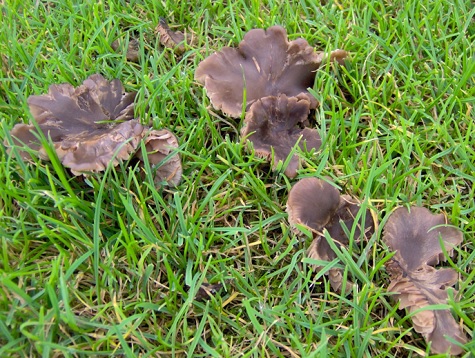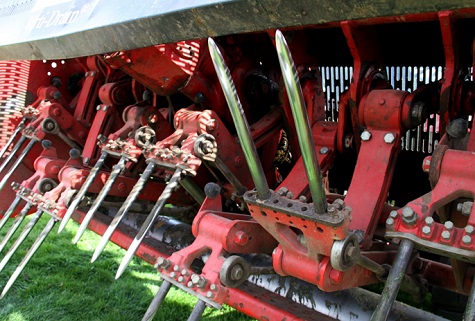With autumn fast approaching we are now starting to see a changing weather front whereby a combination of temperature, humidity and condensation processes take place resulting in the formation of heavy dews appearing on our natural grass playing surfaces in the mornings.
Factors that contribute to the formation of dew include clear skies, calm winds, and high humidity levels. These conditions allow for efficient radiational cooling and a faster drop in temperature. The formation of dew is more likely on cool, clear nights when the air is relatively humid, as opposed to dry or windy nights when the heat loss from the ground is less significant.

Dew can have various effects on grass playing surfaces. It can make the grass wet, potentially affecting traction and ball movement during sports. However, it can also provide a source of moisture for fungi spores to spread and cause a range of turf grass diseases particularly on fine turf playing surfaces such as golf and bowling greens.
Summer stress in turf, particularly in terms of proliferation of turf grass diseases, generally comes to a head during the months of September and October; a time of the year when we tend to see heavy dews forming on natural grass surfaces.
This boundary layer of dew creates a warm, moist environment that can create the environmental conditions favourable for an outbreak of certain turf diseases.
Diseases are caused by fungal and bacterial pathogens. These are the most common infectious agents of plant diseases. If your grass has visible symptoms, the first step is identification to decide if the problem is a plant disease.

The definition of plant disease includes anything that adversely affects plant health. This definition can include such factors as nutrient deficiencies, mower damage, air pollution and pathogens, including nematodes and soil pests.
Other signs of disease presence can include fungal fruiting bodies (such as mushrooms), mycelia, bacterial slime, presence of nematodes or insects, or the presence of insect holes and root damage. Turf grass diseases refer to a variety of fungal, bacterial, or viral infections that affect the health and appearance of grass in lawns, sports fields, golf courses, and other turf areas.
These diseases can cause discoloration, thinning, wilting, and even death of the turf grass if left untreated. Distinct types of grasses are susceptible to specific diseases, and the severity of the disease can vary depending on environmental conditions and cultural practices.
Some common turf grass diseases include:
Brown Patch: This fungal disease primarily affects cool-season grasses during hot and humid conditions, causing circular patches of brown or tan grass.
Dollar Spot: Dollar Spot is another fungal disease that creates small, silver-dollar-sized spots on the turf, usually during warm and humid weather.
Pythium Blight: This disease is caused by a water mould and can quickly kill large areas of turf, especially in hot and wet conditions. It appears as irregularly shaped patches of discoloured, greasy-looking grass.
Leaf Spot: Leaf Spot is a fungal disease that causes small, circular spots on the grass blades. It is commonly seen in warm-season grasses during periods of high humidity or excessive moisture.
Rust: Rust is a fungal disease that gives the grass a rusty or orange appearance. It is often found in lawns with poor fertility or during cool and wet weather.
Snow Mould: Snow Mould is a fungal disease that develops under snow cover during winter. It appears as circular patches of matted, straw-colored grass when the snow melts.

Red Thread: Red thread turf disease, also known as pink patch, is a common fungal infection that affects various types of grass, particularly fine fescues and ryegrasses.
Fusarium turf disease: also known as Fusarium patch or Fusarium blight, is a common fungal disease that affects turfgrass species. It is caused by various species of the Fusarium fungus, particularly Fusarium culmorum and Fusarium oxysporum.
Proper lawn care practices such as regular mowing, appropriate irrigation, and adequate fertilisation can help prevent and manage turf grass diseases. In severe cases, professional assistance from a turf specialist or plant pathologist may be necessary to identify and treat the specific disease affecting the turf grass.
To prevent disease outbreaks in turf, such as on a lawn or sports field, it's essential to establish and maintain good turf health.
Here are some measures you can take to minimise the risk of disease outbreaks:

Proper mowing: Set the mower at the correct height for your turf species and avoid cutting more than one-third of the grass blade's height at a time. Cutting too low weakens the turf and makes it more susceptible to diseases.
Adequate irrigation: Water the turf deeply but infrequently to encourage deep root growth. Avoid frequent shallow watering, as it promotes disease development. Water early in the morning to allow the turf to dry before evening, reducing the chances of disease.
Soil management: Conduct regular soil tests to monitor nutrient levels and pH. Adjust the soil fertility and pH as necessary to promote optimal turf growth. Healthy turf is more resilient to diseases.
Proper fertilisation: Apply fertilisers according to soil test recommendations or the specific needs of your turfgrass. Avoid excessive nitrogen fertilisation, as it can increase susceptibility to diseases. Follow a balanced fertilisation program to promote overall turf health.

Aeration: Perform core aeration at least once a year to relieve soil compaction, improve drainage, and promote root growth. Proper aeration helps maintain turf vigor and reduces disease pressure.
Overseeding and species selection: Overseed bare or thin areas with disease-resistant turfgrass varieties or cultivars. Choose turfgrass species that are well adapted to your region and consider disease-resistant varieties when available.
Proper thatch management: Manage thatch accumulation by regular dethatching or core cultivation. Excessive thatch provides a favourable environment for disease-causing organisms.
Avoid overwatering: Excessive moisture can contribute to disease outbreaks. Water only when necessary, based on the turf's needs and environmental conditions.
Clean equipment: Disinfect or clean mowing equipment, aerators, and other tools between uses to prevent the spread of diseases from one area to another.
Monitor and identify diseases: Regularly inspect the turf for signs of diseases, such as discoloration, spots, or patches. Promptly identify the disease and take appropriate action, such as applying fungicides if necessary.
Avoid traffic stress: Minimise heavy foot or equipment traffic on the turf, especially when it's wet or vulnerable. Compacted or stressed turf is more susceptible to diseases.
Practice proper weed control: Weeds compete with turfgrass and can create conditions favorable for diseases. Follow appropriate weed control measures to maintain a healthy turf.
Remember, prevention is key when it comes to disease outbreaks. By implementing these practices and maintaining good turf management practices, you can reduce the risk of diseases and keep your turf healthy and vibrant.
Please keep in mind that the use of fungicides should be carried out according to the instructions provided by the manufacturer and local regulations. It's also important to consider integrated pest management (IPM) practices, such as proper mowing, irrigation, and fertilisation, to maintain a healthy turf and reduce the need for fungicide applications.